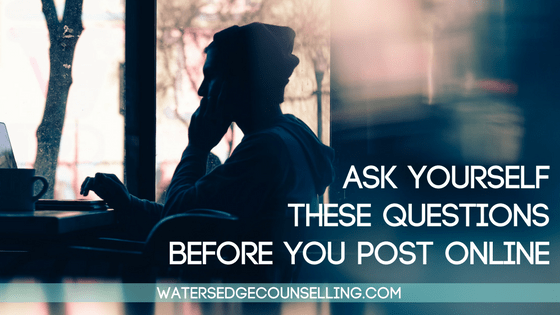
15 years ago, we didn’t know Facebook from Twitter (in fact, Twitter wasn’t even ‘born’ yet), and the concept of sharing every detail of our lives with strangers seemed a bit…weird. Yet today, 1.94 billion of us are on Facebook, and between this and our profiles on Twitter, Snapchat, Pinterest and Instagram, the world knows a lot about us—what we had for dinner, the name of our pet, and how we felt the moment our best friend got married.
Despite our constant use of social media, it snuck up on many of us who signed up believing we’d only use it ‘sometimes’. That means we don’t have a rulebook or guide on what to do—and what not to do, in cyber space. Often, this results in awkward status updates, over-sharing and sometimes, ruined relationships over miscommunication because we used the wrong emoji.
Do these consequences sound familiar to you? By asking yourself these questions before you post online, you will save yourself a lot of heartache and pain.
-
Would I say this to someone in real life?
If you’re sharing something online that you’d never broach with a close friend, your spouse or a colleague, don’t post it. When you do so, you not only allow the world to invade your privacy, but you’re inadvertently telling the people you love that they are not worthy of your time or trust. If you need to discuss something but fear doing so, talk to a counsellor about developing strategies to do this.
-
Will this hurt anyone?
Another great phrase for this one is, “Am I being passive-aggressive or ignorant with my post?” Anything that indirectly (or directly) points the finger at someone you know, contains prejudiced language or images, or uses triggering words needs to be edited or not posted at all. You may not set out to hurt anyone, but by simply posting in the public sphere you have great influence over people’s emotions. Be smart and post with clarity and a clear head.
-
Am I doing this to feel important?
Are you posting selfies everyday? Do you receive a boost when people like your post or gives you a thumbs up? I know I do, which I why I have to constantly ask myself WHY I’m posting content online.
If you’re looking for affirmation and feel deflated when you don’t receive the response you were hoping for, consider stepping back from social media for a while. This habit can also be a symptom for feelings of deep inadequacy, so consider seeing a counsellor or talking about it with people you trust to begin healing.
-
Does anyone care?
This isn’t an excuse to avoid activism (that’s an entirely different topic); rather it’s about the significance of your content. Do people online really care what you ate for dinner? Do they want to know you went for a walk, worked out or that you had a falling-out with a colleague?
There’s room for superfluous posts—a snap of dinner every once in a while or a work out isn’t going to do any harm, and sharing details is useful if you are actively looking for support and want to keep friends up-to-date. But posting stuff simply to keep yourself busy isn’t healthy. Join a community or catch up with a friend instead. Doing life together (mundane details and all) is much more meaningful in real life.
-
Am I being too honest?
Social media and blogging are brilliant, because they allow people to be honest about their stories. Countless people have been inspired by what they’ve read on the Internet, and people find healing by telling their story. But there is a fine line between sharing and over-sharing.
Over-sharing often happens when we feel disconnected, afraid and unheard. Sometimes we’re angry, and occasionally we want pity or praise.
When you’re tempted to post something from this negative headspace, write it down on paper instead and show it to a close friend or your counsellor. Alternatively, you could type it out. But instead of posting it immediately, save it to your phone or computer, and re-read it again in 24 hours. Give yourself the chance to reconsider why you’re sharing it. You deserve to be heard and validated, but this doesn’t happen on the Internet, it happens in relationship, so tread carefully.
-
Does this leave myself, or anyone I know, vulnerable to attack?
Another consequence of over-sharing is the risk of being hurt by people’s responses. If you are in a fragile emotional space or know that you or the people you love may be trolled or harmed due to what you’ve posted, seriously consider why you’re posting it.
We can’t take responsibility for the actions of other people, but we can prepare ourselves for this and even avoid it. Whether it’s a tweet, a blog post or a photo, if you know posting it could unintentionally hurt anyone, talk about it with someone first. Weigh up the pros and cons, and if you post, make sure you have people surrounding you to help with any fall out.
Do you feel anxious or stressed about your online relationships? Would you like to develop strategies to create healthier relationships and care for yourself? Here’s what you need to do: contact Colleen on 0434 337 245 or Duncan on 0434 331 243 for a FREE 10-minute phone consultation on how we can best help you, or press book now.
Leave a Reply